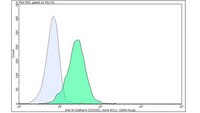MABF3160-100UL Sigma-AldrichAnti-N-Cadherin Antibody, clone 8C11
Anti-N-Cadherin, clone 8C11, Cat. No. MABF3160, is a mouse monoclonal antibody that detects N-Cadherin and is tested for use in Flow Cytometry, Immunocytochemistry, Inhibition Assay, and Western Blotting.
More>> Anti-N-Cadherin, clone 8C11, Cat. No. MABF3160, is a mouse monoclonal antibody that detects N-Cadherin and is tested for use in Flow Cytometry, Immunocytochemistry, Inhibition Assay, and Western Blotting. Less<<Recommended Products
概述
| Replacement Information |
|---|
| References |
|---|
| Product Information | |
|---|---|
| Format | Purified |
| Presentation | Purified mouse monoclonal antibody IgG1 in PBS without preservatives. |
| Quality Level | MQ200 |
| Physicochemical Information |
|---|
| Dimensions |
|---|
| Materials Information |
|---|
| Toxicological Information |
|---|
| Safety Information according to GHS |
|---|
| Safety Information |
|---|
| Packaging Information | |
|---|---|
| Material Size | 100 µL |
| Transport Information |
|---|
| Supplemental Information |
|---|
| Specifications |
|---|
| Global Trade Item Number | |
|---|---|
| 产品目录编号 | GTIN |
| MABF3160-100UL | 04065268900871 |
Documentation
Anti-N-Cadherin Antibody, clone 8C11 MSDS
| 职位 |
|---|
Anti-N-Cadherin Antibody, clone 8C11 分析证书
| 标题 | 批号 |
|---|---|
| Anti-N-Cadherin, clone 8C11 - Q3916317 | Q3916317 |








